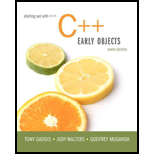
Starting Out with C++: Early Objects (9th Edition)
9th Edition
ISBN: 9780134400242
Author: Tony Gaddis, Judy Walters, Godfrey Muganda
Publisher: PEARSON
expand_more
expand_more
format_list_bulleted
Concept explainers
Question
Chapter 17, Problem 5PC
Program Plan Intro
List Member Deletion
Program Plan:
- Include the required specifications into the program.
- Declare a class ListNode.
- Declare the member variables “value” and “*p” in structure named “ListNode”.
- The data value of node is stored in variable v and address to next pointer is stored in pointer p
- Declare the constructor, destructor, and member functions in the class.
- Declare the structure variable “next” and a friend class Linked List
- Declare a class LinkList.
- Function to insert elements into the linked list “void add(double n)”is defined.
- Function to check whether a particular node with a data value n is a part of linked list or not “bool isMember(double n)”.
- A recursive print method is defined to print all the data values present in the link list “void rPrint()”.
- A destructor is called to delete the desired data value entered by the user called “LinkedList::~LinkedList( )”.
- A method to remove the element passed as a parameter from the link list is called “void LinkedList::remove(double x)”.
- Declaration of structure variable head to store the first node of the list “ListNode * head” is defined.
- A function “void LinkedList::add(double n)” is defined which adds or inserts new nodes into the link list.
- A function “bool LinkedList::isMember(double n)” is defined which searches for a given data value within the nodes present in the link list.
- A destructor “LinkedList::~LinkedList()” deallocates the memory for the link list.
- A function “void LinkedList::print()” is used to print all the node data values present in the link list by traversing through each nodes in the link list.
- A recursive member function check is defined called “bool LinkedList::rIsMember(ListNode *pList,double x)” .
- If the data value entered is present within the link list, it returns true, else it returns false.
- Declare the main class.
- Create an empty list to enter the data values into the list.
- Copy is done using copy constructor.
- Input “5” numbers from user and insert the data values into the link list calling “void LinkedList::add(double n)” function.
- Print the data values of the nodes present in the link list.
- Ask the user to enter an element to be removed.
- A loop is executed to traverse through the list and find the value entered.
- If the element is found, thelist1.remove (number) is called and the element is removed.
- The remaining list elements are printed.
Expert Solution & Answer
Want to see the full answer?
Check out a sample textbook solution
Students have asked these similar questions
Dijkstra's Algorithm (part 1). Consider the network shown below, and Dijkstra’s link-state algorithm. Here, we are interested in computing the least cost path from node E (note: the start node here is E) to all other nodes using Dijkstra's algorithm. Using the algorithm statement used in the textbook and its visual representation, complete the "Step 0" row in the table below showing the link state algorithm’s execution by matching the table entries (i), (ii), (iii), and (iv) with their values. Write down your final [correct] answer, as you‘ll need it for the next question.
4. |z + 5 - 5i| = 7
14.
dz,
C: |z❘
C: |z❘ = 0.6
ze² - 2iz
H
Chapter 17 Solutions
Starting Out with C++: Early Objects (9th Edition)
Ch. 17.1 - Prob. 17.1CPCh. 17.1 - Prob. 17.2CPCh. 17.1 - Prob. 17.3CPCh. 17.1 - Prob. 17.4CPCh. 17.2 - Prob. 17.5CPCh. 17.2 - Prob. 17.6CPCh. 17.2 - Why does the insertNode function shown in this...Ch. 17.2 - Prob. 17.8CPCh. 17.2 - Prob. 17.9CPCh. 17.2 - Prob. 17.10CP
Ch. 17 - Prob. 1RQECh. 17 - Prob. 2RQECh. 17 - Prob. 3RQECh. 17 - Prob. 4RQECh. 17 - Prob. 5RQECh. 17 - Prob. 6RQECh. 17 - Prob. 7RQECh. 17 - Prob. 8RQECh. 17 - Prob. 9RQECh. 17 - Write a function void printSecond(ListNode ptr}...Ch. 17 - Write a function double lastValue(ListNode ptr)...Ch. 17 - Write a function ListNode removeFirst(ListNode...Ch. 17 - Prob. 13RQECh. 17 - Prob. 14RQECh. 17 - Prob. 15RQECh. 17 - Prob. 16RQECh. 17 - Prob. 17RQECh. 17 - Prob. 18RQECh. 17 - Prob. 1PCCh. 17 - Prob. 2PCCh. 17 - Prob. 3PCCh. 17 - Prob. 4PCCh. 17 - Prob. 5PCCh. 17 - Prob. 6PCCh. 17 - Prob. 7PCCh. 17 - Prob. 8PCCh. 17 - Prob. 10PCCh. 17 - Prob. 11PCCh. 17 - Prob. 12PCCh. 17 - Running Back Program 17-11 makes a person run from...Ch. 17 - Read , Sort , Merge Using the ListNode structure...
Knowledge Booster
Learn more about
Need a deep-dive on the concept behind this application? Look no further. Learn more about this topic, computer-science and related others by exploring similar questions and additional content below.Similar questions
arrow_back_ios
SEE MORE QUESTIONS
arrow_forward_ios
Recommended textbooks for you
 C++ Programming: From Problem Analysis to Program...Computer ScienceISBN:9781337102087Author:D. S. MalikPublisher:Cengage Learning
C++ Programming: From Problem Analysis to Program...Computer ScienceISBN:9781337102087Author:D. S. MalikPublisher:Cengage Learning C++ for Engineers and ScientistsComputer ScienceISBN:9781133187844Author:Bronson, Gary J.Publisher:Course Technology PtrProgramming Logic & Design ComprehensiveComputer ScienceISBN:9781337669405Author:FARRELLPublisher:Cengage
C++ for Engineers and ScientistsComputer ScienceISBN:9781133187844Author:Bronson, Gary J.Publisher:Course Technology PtrProgramming Logic & Design ComprehensiveComputer ScienceISBN:9781337669405Author:FARRELLPublisher:Cengage EBK JAVA PROGRAMMINGComputer ScienceISBN:9781337671385Author:FARRELLPublisher:CENGAGE LEARNING - CONSIGNMENT
EBK JAVA PROGRAMMINGComputer ScienceISBN:9781337671385Author:FARRELLPublisher:CENGAGE LEARNING - CONSIGNMENT Systems ArchitectureComputer ScienceISBN:9781305080195Author:Stephen D. BurdPublisher:Cengage Learning
Systems ArchitectureComputer ScienceISBN:9781305080195Author:Stephen D. BurdPublisher:Cengage Learning Microsoft Visual C#Computer ScienceISBN:9781337102100Author:Joyce, Farrell.Publisher:Cengage Learning,
Microsoft Visual C#Computer ScienceISBN:9781337102100Author:Joyce, Farrell.Publisher:Cengage Learning,

C++ Programming: From Problem Analysis to Program...
Computer Science
ISBN:9781337102087
Author:D. S. Malik
Publisher:Cengage Learning

C++ for Engineers and Scientists
Computer Science
ISBN:9781133187844
Author:Bronson, Gary J.
Publisher:Course Technology Ptr

Programming Logic & Design Comprehensive
Computer Science
ISBN:9781337669405
Author:FARRELL
Publisher:Cengage

EBK JAVA PROGRAMMING
Computer Science
ISBN:9781337671385
Author:FARRELL
Publisher:CENGAGE LEARNING - CONSIGNMENT

Systems Architecture
Computer Science
ISBN:9781305080195
Author:Stephen D. Burd
Publisher:Cengage Learning

Microsoft Visual C#
Computer Science
ISBN:9781337102100
Author:Joyce, Farrell.
Publisher:Cengage Learning,